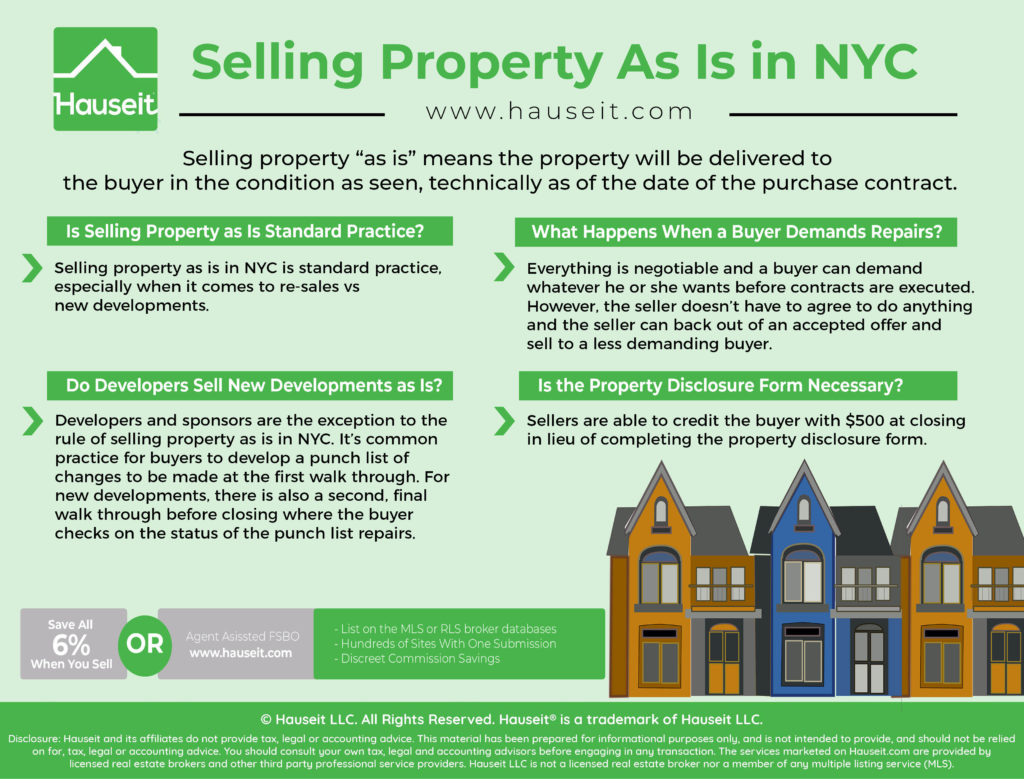Selling property “as is” means the property will be delivered to the buyer in the condition as seen, technically as of the date of the purchase contract. This means the seller won’t be making any custom changes or repairs to the property before closing on behalf of the buyer.
Table of Contents:

Selling property as is in NYC is widely expected by both buyers and sellers in a normal or hot seller’s market.
In fact, it’s so standard for apartments and houses to be sold as is in New York that the following language is typically included in your purchase contract:
Seller makes no representation as to the physical condition or state of repair of the unit, the included interests or the premises. Purchaser has inspected or waived inspection of the unit and the included interests or the premises and shall take the same “as is”, as of the date of this contract, except for reasonable wear and tear. However, at the time of closing, the appliances shall be in working order and required smoke detectors shall be installed and operable.
At closing, seller shall deliver possession of the unit and included interests in the condition required by the previous section, broom clean, vacant and free of all occupants and rights of possession.
A Full Service Listing for 1%
Sell your home with a traditional full service listing for just one percent commission.
Everything is negotiable and a buyer can demand whatever he or she wants before contracts are executed. However, the seller doesn’t have to agree to do anything and the seller can back out of an accepted offer and sell to a less demanding buyer.
Once contracts have been signed by all parties, the buyer can’t demand repairs as the language in the contract will govern.
Unless the seller has agreed to perform specific repairs that is also documented in the contract, the buyer is out of luck at this stage and can’t demand new changes or repairs before closing.
Do sellers ever agree to perform repairs on behalf of the buyer? Sure. It all depends on the willingness of the seller to get his or her hands dirty, and the competitive dynamics of the listing and the NYC real estate market overall.
If the market is slow and there is lots of competing inventory on the market, then buyers will have more leverage and options. In this situation, sellers may have to be more amenable to custom demands such as fixing or repairing a few items within their apartment as a condition in the contract.
Sellers will be especially amenable to custom repairs and changes if they don’t have any other offers, perhaps because they mispriced their home and their listing is now stale on the market. This often happens if a seller priced their property too high and had to reduce their price months later. The damage is irreversible at this point as it becomes very obvious that the seller does not have any other offers.
Developers and sponsors are the exception to the rule of selling property as is in NYC. This is primarily because buying a new construction home in NYC often involves purchasing an apartment that isn’t finished yet.
Often times, new development condo buyers are purchasing based off of a model unit as their specific apartment or the building itself isn’t even finished yet.
Furthermore, because new construction units are by definition brand new, there are bound to be defects or errors in workmanship that a reasonable buyer would want made.
As a result, it’s common practice for buyers to develop a punch list of changes to be made at the first walk through. For new developments, there is also a second, final walkthrough before closing where the buyer checks on the status of the punch list repairs.
It’s important to understand that developers are only bound to make a good faith effort to address any punch list items within a reasonable amount of time after closing. Furthermore, the punch list is jointly developed with the listing agent or sponsor’s representative, so it must be reasonable in nature.
Get a 2% Rebate When You Buy
Save thousands on your home purchase with a buyer agent commission rebate from Hauseit
While being fairly standard in some other states, the seller property disclosure form is typically not filled out by sellers in New York.
Instead, sellers are able to credit the buyer with $500 at closing in lieu of completing the property disclosure form.
This strategy is congruent with selling property as is in NYC, as it makes no sense to state in the contract that the property is being sold as is without any representation as to its condition but to also make a separate statement about the condition of the property.
Furthermore, most sellers are not engineers by background and would have no idea how to answer some of the questions.
For example, one of the form’s questions is whether there are any known defects in the foundation or slab. Most sellers would ask, what’s a foundation or slab?
Lastly, the principle of caveat emptor, or buyer beware, is utilized in New York. Caveat emptor reinforces the practice of selling property as is in NYC and putting the onus of due diligence on buyers.
It’s up to the buyer and the buyer’s attorney to conduct thorough legal and financial due diligence after an offer has been accepted but before a contract has been signed. The buyer’s attorney will review the original condo or co-op offering plan, the building financial statements, any amendments to the original offering plan and the co-op or condo board meeting minutes.
The buyer’s attorney will also order a title report or co-op lien search, depending on whether the buyer is purchasing real property or a co-op apartment.
A Full Service Listing for 1%
Sell your home with a traditional full service listing for just one percent commission.
Disclosure: Commissions are not set by law or any Realtor® association or MLS and are fully negotiable. No representation, guarantee or warranty of any kind is made regarding the completeness or accuracy of information provided. Square footage numbers are only estimates and should be independently verified. No legal, tax, financial or accounting advice provided.






